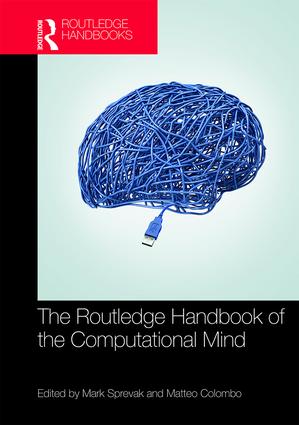Routledge Handbook of the Computational Mind
(with Matteo Colombo)
2018 Routledge: London, 526 pp.
Last updated 14 June 2019
Computational approaches dominate contemporary cognitive science, promising a unified, scientific explanation of how the mind works. However, computational approaches raise major philosophical and scientific questions. In what sense is the mind computational? How do computational approaches explain perception, learning, and decision making? What kinds of challenges should computational approaches overcome to advance our understanding of mind, brain, and behaviour?
The Routledge Handbook of the Computational Mind is an outstanding overview and exploration of these issues and the first philosophical collection of its kind. Comprising thirty-five chapters by an international team of contributors from different disciplines, the Handbook is organised into four parts:
- History and future prospects of computational approaches
- Types of computational approach
- Foundations and challenges of computational approaches
- Applications to specific parts of psychology
Essential reading for students and researchers in philosophy of mind, philosophy of psychology, and philosophy of science, The Routledge Handbook of the Computational Mind will also be of interest to those studying computational models in related subjects such as psychology, neuroscience, and computer science.
Reviews
Anyone interested in the fundamental issues confronted by computational approaches to mind will find this collection indispensable. Packed full of penetrating and insightful analyses from expert contributors, it not only perfectly captures the history and the current state of this important field, it helps set the agenda for its future.
– Professor Mike Wheeler, University of Stirling
This Handbook offers an unparalleled guide to navigating the world of computational cognitive science. It is a timely reminder of why cognitive science needs philosophy: our empirical claims are only as good as the conceptual frameworks that undergird them.
– Professor Sam Gershman, Harvard University
This excellent book will be the foundation of myriad university courses. Particularly impressive is the way that many of the chapters adopt an approach that is informed, but never overwhelmed, by philosophical reasoning. This makes the book an incisive and informative read.
– Professor Peter Dayan, University College London
This is an indispensable resource not only for understanding the strengths and weaknesses of the computational view of mind, but for understanding exactly what that view is. This is the place to go for the clearest, most up-to-date expositions of the key claims and concepts concerning the computational mind.
– Dr Ron Chrisley, University of Sussex
A great end a wonderful book. @msprevak and Matteo Colombo, all of the authors, should be rightfully proud of their achievements. This balanced collection gives a state of the art, the known unknowns, and some sober reflection on computation in cognition and brain science. [This thread on Twitter, with 200+ posts, reviews the book chapter by chapter.]
– Professor Philip Corlett, Yale
I was inspired by the plurality that the editors and authors advocated; computational scientists can pick methods and approaches for specific problems and see how they afford a deeper or more satisfying explanation of a particular phenomenon.
In providing an excellent synopsis of the history, theoretical understandings, cutting-edge issues, and empirical research programmes of the CTM, this volume constitutes a comprehensive and rounded explication of everything you need to know about the computational research paradigm.
Contents
Part 1: History and Future Directions
Computational thought from Descartes to Lovelace – Alistair M.C. Isaac
Turing and the first electronic brains: What the papers said – Diane Proudfoot and Jack Copeland
British cybernetics (or ‘The disembodiment of mind’) – Joseph Dewhurst
Cybernetics – Tara Abraham
Turing-equivalent computation at the “conception” of cognitive science – Kenneth Aizawa
Connectionism and post-connectionist models – Cameron Buckner and James Garson
Artificial Intelligence – Murray Shanahan
Part 2: Types of Computing
Classical computational models – Richard Samuels
Explanation and connectionist models – Catherine Stinson
Dynamic information processing – Frank Faries and Anthony Chemero
Probabilistic models – David Danks
Prediction error minimization in the brain – Jakob Hohwy
Part 3: Foundations and Challenges
Computational implementation – J. Brendan Ritchie and Gualtiero Piccinini
Computation and levels in cognitive and neural science – Lotem Elber-Dorozko and Oron Shagrir
Reductive explanation between psychology and neuroscience – Daniel A. Weiskopf
Helmholtz’s vision: Underdetermination, behavior and the brain – Clark Glymour and Ruben Sanchez-Romero
The nature and function of content in computational models – Frances Egan
Maps, models and computational simulations in the mind – William Ramsey
The cognitive basis of computation: Putting computation in its place – Daniel D. Hutto, Erik Myin, Anco Peeters and Farid Zahnoun
Computational explanations and neural coding – Rosa Cao
Computation, consciousness, and “Computation and consciousness” – Colin Klein
Concepts, symbols and computation: An integrative approach – Jenelle Salisbury and Susan Schneider
Embodied cognition – Marcin Miłkowski
Tractability and the computational mind – Jakub Szymanik and Rineke Verbrugge
Part 4: Applications
Computational cognitive neuroscience – Carlos Zednik
Simulation in computational neuroscience – Liz Irvine
Learning and reasoning – Matteo Colombo
Vision – Mazviita Chirimuuta
Perception without computation? – Nico Orlandi
Motor computation – Michael Rescorla
Computational models of emotion – Xiaosi Gu
Computational psychiatry – Stefan Brugger and Matthew Broome
Computational approaches to social cognition – John Michael and Miles MacLeod
Computational theories of group behavior – Bryce Huebner and Joseph Jebari
